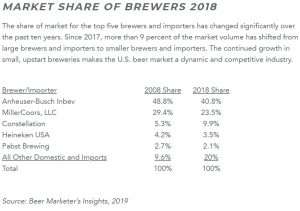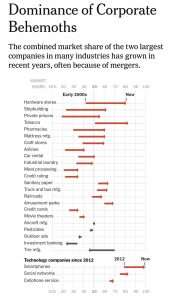If You Think Capitalism Is Dying Because Two Companies 'Control 90 Percent of the Beer Americans Drink,' Go Home, You're Drunk
Obituaries for the benefits of free markets are as numerous as they are wrongheaded.

You can't swing a dead grumpy cat these days without hitting headlines declaring the imminent death of capitalism, the failure of capitalism, and the rebirth of socialism.

But before we bury capitalism, it's worth pointing out that rumors of its demise are greatly exaggerated. For instance, it was only last fall that a "global tipping point" was reached, meaning that "half the world is now middle class or wealthier," according to researchers at the Brookings Institution. How did that happen? By bringing increasing levels of market forces to bear around the planet, especially in the developing world. China is nobody's idea of a pure capitalist economy but it has clearly moved in that general direction over the past several decades. As U2's Bono, who has spent a great deal of time and energy trying to help the developing world, will tell you, "commerce, entrepreneurial capitalism takes more people out of poverty than aid—of course, we know that." (To be sure, the legendary frontman is no anarcho-capitalist, telling a crowd at Davos this year that while "capitalism has taken more people out of poverty than any other 'ism'… it is a wild beast that, if not tamed, can chew up a lot of people along the way.")
In Europe and North America, concerns about the death of capitalism stem mostly from flat or slow economic growth for basically all of the 21st century. That the rest of the world is catching up to us probably doesn't make anyone feel better, either. But even in the United States, apparent reductions in the middle class are explained in part by households bumping up into higher income categories. And it turns out that when economists control for household size and use an accurate measure of inflation, "the story of stagnating wages was mostly wrong." Indeed, as Michael R. Strain, writes, "median household income grew by 43% between 1990 and 2015 (the last year for which data is available). Households in the bottom 20% saw their incomes increase by 62%." It's also true that contrary to the conventional wisdom, "the rich" did not capture all the new wealth created over the past several decades. As Russ Roberts has shown, when you track actual individuals across time, "the richest people in 1980 actually ended up poorer, on average, in 2014. Like the top 20%, the top 1% in 1980 were also poorer on average 34 years later in 2014."
So maybe capitalism is still delivering the goods by and large. And by goods, I mean general, broad-based increases in living standards (yes, even for Millennials and Gen Z).
Except for beer, right? Jonathan Tepper, author of The Myth of Capitalism, argues that the essence of capitalism is competition, which is flatter than Beto O'Rourke's new haircut. Writing at Bloomberg, Tepper avers:
Competition is the essence of capitalism, yet it is dying.
Rising market power by dominant firms has created less competition, lower investment in the real economy, lower productivity, less economic dynamism with fewer startups, higher prices for dominant firms, lower wages and more wealth inequality….
In industry after industry, [Americans] can only purchase from local monopolies or oligopolies that can tacitly collude. The U.S. now has many industries with only three or four competitors controlling entire markets. Since the early 1980s, market concentration has increased severely.

Among the evidence he marshals is the fact that "two corporations control 90 percent of the beer Americans drink." Tepper's numbers seem a bit high. According to the latest edition of Beer Marketer's Insights, a trade publication, Anheuser-Busch Inbev controls 41 percent of the market, MillerCoors owns another 24 percent, and "since 2017, more than 9 percent of the market volume has shifted from large brewers and importers to smaller brewers and importers."

But let's grant Tepper his large point: Two mega-players dominate the market for beer. How has that been working out for beer drinkers? Pretty damn well, actually. Go back to, say, 1990, when the microbrewery revolution was barely a thing and I started graduate school at SUNY-Buffalo. My friends and I would drive across the Peace Bridge to Canada specifically to drink Molson and Labatt's because it was so much better than American beer. Such a thought is inconceivable now given the proliferation of choices available to today's beer drinkers. Some of that choice comes from Anheuser-Busch, MillerCoors, and other big brewers, and much of it comes from small, scrappy startups.
But the point is that the number of firms in an industry doesn't dictate the amount of choice that consumers have. Check out the illustration to the side here from a tweet by The New York Times' David Leonhardt. It shows increased concentration in various sectors. But has there been a concomitant reduction in either consumer choice or quality of service? Think of mattresses, one of the products listed. Has it ever been easier or more cost-effective to shop for a mattress, including ones based on whole new technologies? Tepper opens his Bloomberg piece by recounting the 2017 beating that Dr. David Dao took on a United Airlines flight. He implies that airlines can treat their customers anyway they want because "the American skies have gone from an open market with many competing airlines to a cozy oligopoly with four major airlines." Yet that incident was shocking precisely because it was so rare; drawing any implications from it is ridiculous. Over the past decade, the on-time performance of airlines has effectively stayed the same, which suggests that airlines are still competing for customers. So has the safety record for domestic carriers. Airlines have gotten better at maximizing the number of passengers per flight, which might make flying less comfortable, but they've also passed on savings to customers. "The average airfare has been lower because airlines have been putting their capacity to better use," note researchers at the St. Louis Federal Reserve Bank. Monopolists tend not to be so generous.
None of this is to say the status quo is perfect or that it shouldn't be challenged. In many parts of the economy, corporations works in cahoots with the government to rig markets (lord knows this is happening big time in the tech and social media sectors as we speak). Donald Trump's trade war with China points to more problems. We always need more creative destruction than we're getting at any point in time. But to focus on the number of firms in a sector rather than what is being offered to consumers is to make a very basic analytical error and one that opens up space not for the best elements of laissez-faire but the worst forms of a strangulated future.
Enjoy a chill, classic Reason video from 2009. It's called "Beer: An American Revolution—How Microbreweries Promote Choice."


Show Comments (78)